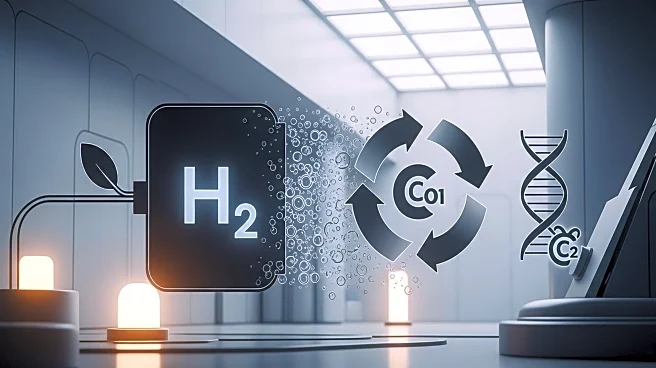What's Happening?
General Motors (GM) has announced the cessation of its next-generation hydrogen fuel cell development through its Hydrotec brand, shifting focus towards battery electric vehicles and charging technology. Despite discontinuing hydrogen fuel cell development for vehicles, GM will continue producing hydrogen fuel cells for data centers and power generation through its joint venture with Honda, Fuel Cell System Manufacturing LLC. The decision is influenced by high costs and limited hydrogen infrastructure in the U.S., with only 61 hydrogen refueling stations compared to over 250,000 electric vehicle charging locations. Meanwhile, Mercedes-Benz has joined the Renewable Carbon Initiative (RCI), aiming to use fossil-free vehicle components and develop solutions for a carbon-based circular economy. This move aligns with Mercedes-Benz's commitment to responsible resource use and decarbonization.
Why It's Important?
GM's decision to halt hydrogen fuel cell development reflects broader industry trends prioritizing electric vehicles due to clearer market traction and infrastructure support. This shift could accelerate the transition to electric vehicles, impacting the automotive industry's investment strategies and consumer choices. Mercedes-Benz's involvement in the RCI highlights a growing commitment to sustainability and resource conservation, potentially influencing industry standards and practices. These developments may affect stakeholders across the automotive sector, including manufacturers, suppliers, and consumers, as companies adapt to evolving environmental and economic pressures.
What's Next?
GM will focus its research and development efforts on battery technology and electric vehicles, potentially leading to advancements in EV performance and infrastructure. Mercedes-Benz plans pilot projects for 2026, exploring carbon capture and utilization for automotive plastics and bio-based carbon sources. These initiatives may foster innovation in sustainable automotive manufacturing and supply chain practices. As the industry shifts towards renewable energy and circular economy models, stakeholders may need to adapt to new technologies and regulatory frameworks, influencing future market dynamics.
Beyond the Headlines
The discontinuation of hydrogen fuel cell development by GM and similar moves by other companies like Stellantis underscore the challenges faced by hydrogen technology in achieving commercial viability. The focus on electric vehicles and renewable carbon initiatives may drive long-term shifts in automotive manufacturing, emphasizing sustainability and resource efficiency. These changes could have ethical and environmental implications, prompting discussions on the role of technology in addressing climate change and resource depletion.










